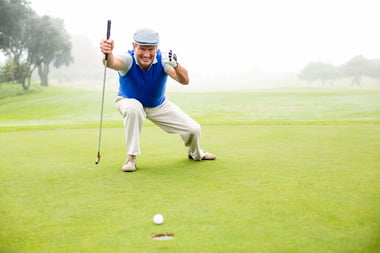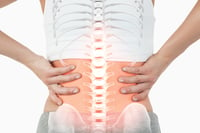One of the biggest misconceptions in the sporting world is that golf is not a physically demanding sport. Yet it’s a sport that requires strength, flexibility, and power to have good performance and, more importantly, avoid injury.
Like any sport, injuries in golf are not completely avoidable but with the right technique and physical conditioning they can be limited. According to research the most common golf related injuries are rotator cuff injuries, tennis elbow, golfer’s elbow, back strains, and tendonitis.
So how exactly do we limit the chance of these injuries and improve our golf game in the process?
Well let’s start with two of the most common mistakes:
- Not warming up before our round and cooling down after our round. The golf swing is a complex unilateral movement that requires great forces to be both produced and absorbed by the body. Furthermore, it requires multiple joints and muscles to work together as a unit. Warming up the body helps to increase blood flow to the working muscles allowing them to perform better, increases nerve impulses that help to control the muscle function, and increase joint range of motions, all of which help to prevent injuries and improve golfing performance. Cooling down helps the body to return to the resting state thereby aiding in recovery and limiting the possibility of soreness.

- Another common mistake is increasing volume too quickly. If you don’t use a rubber band for an extended period, the rubber can become weakened and easily stretch beyond its limits making tears in the rubber a real possibility. It’s the same thing with being sedentary all winter. Your muscles are weakened and not use to the stressors of golf so doing too much too quickly can cause injuries.
Many of the injuries we see in golf are overuse injuries, denoting they are related to repetitive action. This is where the importance of sound technique comes in: if we are going to repeat the same movement again and again, we better make sure it is a well executed movement. While golfing lessons may help to perfect your swing, the foundation is your overall body biomechanics. Fpr example; if you don’t have proper range into your hips, you will be limited in your ability to load up during your backswing meaning you will need to compensate. The issue is that one compensation leads to another which leads to another and so on. This blog by Golf Made Simple recounts the hilarious compensation cycle (although not hilarious when you are caught in it!) https://golfmadesimple.com/blog/golf-swing-built-compensations/ .
Another reason we may see poor golf performance or injury is due to a lack of overall fitness. While not the most demanding of sports, golf does require its players to perform for 2-4 hours/round meaning some level of cardiovascular fitness is needed. Increased fitness means we are less likely to tire during our round, resulting in better performance and decreasing the likelihood of injury. Injuries typically occur when the muscles are fatigued and at their breaking point, which will be occur earlier for the unconditioned individual.

Now that we know what we need to do let’s talk about the how! Implementing these tips can be challenging on your own, which is why it is best to seek the guidance of a professional. From February 13-April 10 we will be running a Golf prep program at Bodiworks. Under the guidance of Ana, a Registered Kinesiologist and former competitive golfer we will work on balance, strength, flexibility and injury prevention to ensure you are ready to hit the tee come spring!
References:
https://www.upmc.com/services/sports-medicine/for-athletes/golf
https://www.aesmphysiotherapytoronto.ca/10-most-common-and-avoidable-golf-injuries/
https://www.sportsinjuryclinic.net/sport-injuries/sports-injury-prevention/warm-up-cool-down
https://golfmadesimple.com/blog/golf-swing-built-compensations/ .
